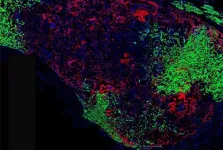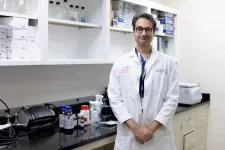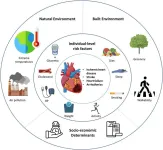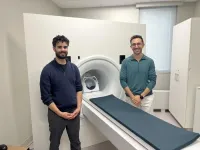(Press-News.org) A new study finds that a natural compound found in many plants inhibits the growth of drug-resistant Candida fungi — including its most virulent species, Candida auris, an emerging global health threat. The journal ACS Infectious Diseases published the discovery led by scientists at Emory University.
Laboratory-dish experiments showed that the natural compound, a water-soluble tannin known as PGG, blocks 90% of the growth in four different species of Candida fungi. The researchers also discovered how PGG inhibits the growth: It grabs up iron molecules, essentially starving the fungi of an essential nutrient.
By starving the fungi rather than attacking it, the PGG mechanism does not promote the development of further drug resistance, unlike existing antifungal medications. Laboratory-dish experiments also showed minimal toxicity of PGG to human cells.
“Drug-resistant fungal infections are a growing healthcare problem but there are few new antifungals in the drug-development pipeline,” says Cassandra Quave, senior author of the study and assistant professor in Emory School of Medicine’s Department of Dermatology and the Center for the Study of Human Health. “Our findings open a new potential approach to deal with these infections, including those caused by deadly Candida auris.”
C. auris is often multidrug-resistant and has a high mortality rate, leading the Centers for Disease Control and Prevention (CDC) to label it a serious global health threat.
“It’s a really bad bug,” says Lewis Marquez, first author of the study and a graduate student in Emory’s molecular systems and pharmacology program. “Between 30 to 60% of the people who get infected with C. auris end up dying.”
An emerging threat
Candida is a yeast often found on the skin and in the digestive tract of healthy people. Some species, such as Candida albicans, occasionally grow out of control and cause mild infections in people.
In more serious cases, Candida can invade deep into the body and cause infections in the bloodstream or organs such as the kidney, heart or brain. Immunocompromised people, including many hospital patients, are most at risk for invasive Candida infections, which are rapidly evolving drug resistance.
In 2007, the new Candida species, C. auris, emerged in a hospital patient in Japan. Since then, C. auris has caused health care-associated outbreaks in more than a dozen countries around the world with more than 3,000 clinical cases reported in the United States alone.
A ‘natural’ approach to drug discovery
Quave is an ethnobotanist, studying how traditional people have used plants for medicine to search for promising new candidates for modern-day drugs. Her lab curates the Quave Natural Product Library, which contains 2,500 botanical and fungal natural products extracted from 750 species collected at sites around the world.
“We’re not taking a random approach to identify potential new antimicrobials,” Quave says. “Focusing on plants used in traditional medicines allows us to hone in quickly on bioactive molecules.”
Previously, the Quave lab had found that the berries of the Brazilian peppertree, a plant used by traditional healers in the Amazon for centuries to treat skin infections and some other ailments, contains a flavone-rich compound that disarms drug-resistant staph bacteria.
Screens by the Quave lab had also found that the leaves of the Brazilian peppertree contain PGG, a compound that has shown antibacterial, anticancer and antiviral activities in previous research.
A 2020 study by the Quave lab, for instance, found that PGG inhibited growth of Carbapenem-resistant Acinetobacter baumannii, a bacterium that infects humans and is categorized as one of five urgent threats by the CDC.
The Brazilian peppertree, an invasive weed in Florida, is a member of the poison ivy family. “PGG has popped up repeatedly in our laboratory screens of plant compounds from members of this plant family,” Quave says. “It makes sense that these plants, which thrive in really wet environments, would contain molecules to fight a range of pathogens.”
Experimental results
The Quave lab decided to test whether PGG would show antifungal activity against Candida.
Laboratory-dish experiments demonstrated that PGG blocked around 90% of the growth in 12 strains from four species of Candida: C. albicans, multidrug-resistant C. auris and two other multidrug-resistant non-albicans Candida species.
PGG is a large molecule known for its iron-binding properties. The researchers tested the role of this characteristic in the antifungal activity.
“Each PGG molecule can bind up to five iron molecules,” Marquez explains. “When we added more iron to a dish, beyond the sequestering capacity of the PGG molecules, the fungi once again grew normally.”
Dish experiments also showed that PGG was well-tolerated by human kidney, liver and epithelial cells.
“Iron in human cells is generally not free iron,” Marquez says. “It is usually bound to a protein or is sequestered inside enzymes.”
A potential topical treatment
Previous animal studies on PGG have found that the molecule is metabolized quickly and removed from the body. Instead of an internal therapy, the researchers are investigating its potential efficacy as a topical antifungal.
“If a Candida infection breaks out on the skin of a patient where a catheter or other medical instrument is implanted, a topical antifungal might prevent the infection from spreading and entering into the body,” Marquez says.
As a next step, the researchers will test PGG as a topical treatment for fungal skin infections in mice.
Meanwhile, Quave and Marquez have applied for a provisional patent for the use of PGG for the mitigation of fungal infections.
“These are still early days in the research, but another idea that we’re interested in pursuing is the potential use of PGG as a broad-spectrum microbial,” Quave says. “Many infections from acute injuries, such as battlefield wounds, tend to be polymicrobial so PGG could perhaps make a useful topical treatment in these cases.”
Scientists from the University of Toronto are co-authors of the paper, including Yunjin Lee, Dustin Duncan, Luke Whitesell and Leah Cowen. Whitesell and Cowen are co-founders and shareholders in Bright Angel Therapeutics, a platform company for development of antifungal therapeutics, and Cowen is a science advisor for Kapoose Creek, a company that harnesses the therapeutic potential of fungi.
The work was supported by grants from the National Institutes of Health, National Center for Complementary and Integrative Health; the Jones Center at Ichauway, the CIHR Frederick Banting and Charles Best Canada Graduate Scholarship and the Canadian Institutes of Health Research Foundation.
END
Natural compound found in plants inhibits deadly fungi
Laboratory-dish experiments show that a water-soluble tannin blocks growth in Candida species
2023-09-13
ELSE PRESS RELEASES FROM THIS DATE:
Study reveals why cancer may spread to the spine
2023-09-13
The vertebral bones that form the spine are derived from a distinct type of stem cell that secretes a protein favoring tumor metastases, according to a study led by researchers at Weill Cornell Medicine. The discovery opens up a new line of research on spinal disorders, helps explain why solid tumors so often spread to the spine, and could lead to new orthopedic and cancer treatments.
In the study, published Sept. 13 in Nature, the researchers discovered that vertebral bone is derived from ...
Research empirically shows structural discrimination negatively impacts LGB youth and adults
2023-09-13
“This study provides evidence that supports the belief of researchers and advocates that national policies protecting the human rights of lesbian, gay and bisexual people have an impact on individual development,” University of Delaware Assistant Professor Eric K. Layland said. “For LGB people, many of these identity and social milestones occur during the critical developmental period of adolescence. Results of this study add to other research showing protective policy can benefit LGB health by ...
UTHealth Houston study: Unruptured brain aneurysms may be missed in routine clinical care, but AI-powered algorithm can help
2023-09-13
Unruptured cerebral aneurysms of sizes and locations that require attention may be frequently missed in routine clinical care, but a machine learning algorithm could minimize missed care opportunities, according to a new study from UTHealth Houston.
The research, published today in Stroke: Vascular and Interventional Neurology, was led by senior author Sunil A. Sheth, MD, associate professor in the Department of Neurology with McGovern Medical School at UTHealth Houston, as well as co-first authors Hyun Woo Kim, MD, vascular and interventional neurology fellow at UTHealth Houston, and ...
Electrifying vehicles in Chicago would save lives, reduce pollution inequities
2023-09-13
If the Chicago region replaced 30% of all on-road combustion-engine vehicles — including motorcycles, passenger cars and trucks, buses, refuse trucks and short- and long-haul trucks — with electric versions, it would annually save more than 1,000 lives and over $10 billion, according to a new Northwestern University study.
The new study, which simulates air quality at a neighborhood scale, also found that areas with predominantly Black, Hispanic and Latinx residents would benefit most.
The study underscores the potential of electric vehicles (EVs) to improve ...
Noted experts present detailed evidence on the impact of environmental issues on cardiovascular health
2023-09-13
Philadelphia, September 13, 2023 – There is already robust evidence that people living with cardiovascular disease are disproportionately affected by poor air quality and extreme temperatures, in large part due to climate change, the greatest threat to human health of the 21st century. In this special theme issue of the Canadian Journal of Cardiology, published by Elsevier, noted experts comprehensively review how climate change occurs and increases the risk of cardiovascular disease and provide practical tips on how to become a climate-smart cardiovascular healthcare provider.
Not long ago, climate change was a fringe topic deemed only ...
Western researchers use AI to predict recovery after serious brain injury
2023-09-13
Two graduate students from Western University have developed a ground-breaking method for predicting which intensive care unit (ICU) patients will survive a severe brain injury.
Matthew Kolisnyk and Karnig Kazazian combined functional magnetic resonance imaging (fMRI) with state-of-the art machine learning techniques to tackle one of the most complex issues in critical care.
Whether it is the result of a stroke, cardiac arrest or traumatic brain injury, lives can forever be changed by a serious brain injury. When patients are admitted to the ICU, families are faced with tremendous uncertainty. Will my loved one recover? Are they aware of what is going on? Will they ever be the same ...
Flu: Interferon-gamma from T follicular helper cells is required to create lung-resident memory B cells
2023-09-13
BIRMINGHAM, Ala. – During a bout of influenza, B cells interact with other immune cells and then take different paths to defend the body. One path is the B cells that differentiate into antibody producing cells. Another path is the B cells that differentiate into lung-resident memory B cells, or lung-BRMs, that are critical for pulmonary immunity.
Unlike antibody-producing B cells that help fight the current infection, the long-lived, non-circulating lung-BRMs migrate to the lungs from draining lymph nodes. ...
Three University of Oklahoma faculty receive National Institutes of Health funding to maximize their research
2023-09-13
For the first time in one year, three faculty at the University of Oklahoma have received Maximizing Investigators’ Research Awards from the National Institutes of Health.
The recipients are Gallogly College of Engineering faculty Vivek Bajpai, Ph.D., John R. Clegg, Ph.D., and Stefan Wilhelm, Ph.D. The highly competitive five-year, $1,866,485 grants will support their ambitious research programs without the need to recompete for funding throughout the duration of their awards.
Bajpai, an assistant professor in the School of Sustainable Chemical, Biological and Materials Engineering, will lead the project, “Epigenetic and Transcriptional ...
UNIST, DGIST, and POSTECH consortium selected for 2023 ITRC Project in ‘Quantum ICT’ sector!
2023-09-13
The consortium, comprising of UNIST, DGIST, and POSTECH has been chosen for the esteemed 2023 University ICT Research Center Project (ITRC) by the Ministry of Science and ICT (MSIT). This prestigious selection recognizes their expertise in the ‘Quantum Information and Communication Technologies‘ sector. The consortium aims to develop advanced quantum technologies while nurturing exceptional master’s and doctorate-level talents. With a total funding amounting to 8.25 billion won—7.5 billion won from government subsidies—the project spans eight years.
The kick-off meeting held at UNIST on August ...
Human emmisions drive changes in north Atlantic ocean temperatures, west African rainfall, hurricanes
2023-09-13
A new climate study led by scientists at the University Miami Rosenstiel School of Marine, Atmospheric, and Earth Science found that temperature fluctuations in the tropical Atlantic Ocean temperature is largely driven by human-induced aerosol emissions, impacting rainfall in West Africa’s Sahel region and hurricane formation in the Atlantic.
The findings, published in the journal Nature, comes in a year when several hurricanes, including Hurricane Idalia, formed within days of each other over the tropical Atlantic.
“Our ...
LAST 30 PRESS RELEASES:
A promising potential therapeutic strategy for Rett syndrome
How time changes impact public sentiment in the U.S.
Analysis of charred food in pot reveals that prehistoric Europeans had surprisingly complex cuisines
As a whole, LGB+ workers in the NHS do not experience pay gaps compared to their heterosexual colleagues
How cocaine rewires the brain to drive relapse
Mosquito monitoring through sound - implications for AI species recognition
UCLA researchers engineer CAR-T cells to target hard-to-treat solid tumors
New study reveals asynchronous land–ocean responses to ancient ocean anoxia
Ctenophore research points to earlier origins of brain-like structures
Tibet ASγ experiment sheds new light on cosmic rays acceleration and propagation in Milky Way
AI-based liquid biopsy may detect liver fibrosis, cirrhosis and chronic disease signals
Hope for Rett syndrome: New research may unlock treatment pathway for rare disorder with no cure
How some skills become second nature
SFU study sheds light on clotting risks for female astronauts
UC Irvine chemists shed light on how age-related cataracts may begin
Machine learning reveals Raman signatures of liquid-like ion conduction in solid electrolytes
Children’s Hospital of Philadelphia researchers emphasize benefits and risks of generative AI at different stages of childhood development
Why conversation is more like a dance than an exchange of words
With Evo 2, AI can model and design the genetic code for all domains of life
Discovery of why only some early tumors survive could help catch and treat cancer at very earliest stages
Study reveals how gut bacteria and diet can reprogram fat to burn more energy
Mayo Clinic researchers link Parkinson's-related protein to faster Alzheimer's progression in women
Trends in metabolic and bariatric surgery use during the GLP-1 receptor agonist era
Loneliness, anxiety symptoms, depressive symptoms, and suicidal ideation in the all of us dataset
A decision-support system to personalize antidepressant treatment in major depressive disorder
Thunderstorms don’t just appear out of thin air - scientists' key finding to improve forecasting
Automated CT scan analysis could fast-track clinical assessments
New UNC Charlotte study reveals how just three molecules can launch gene-silencing condensates, organizing the epigenome and controlling stem cell differentiation
Oldest known bony fish fossils uncover early vertebrate evolution
High‑performance all‑solid‑state magnesium-air rechargeable battery enabled by metal-free nanoporous graphene
[Press-News.org] Natural compound found in plants inhibits deadly fungiLaboratory-dish experiments show that a water-soluble tannin blocks growth in Candida species







